Ethical and Legal Principles Case Study 2022
VerifiedAdded on 2022/09/26
|7
|2097
|44
AI Summary
Contribute Materials
Your contribution can guide someone’s learning journey. Share your
documents today.
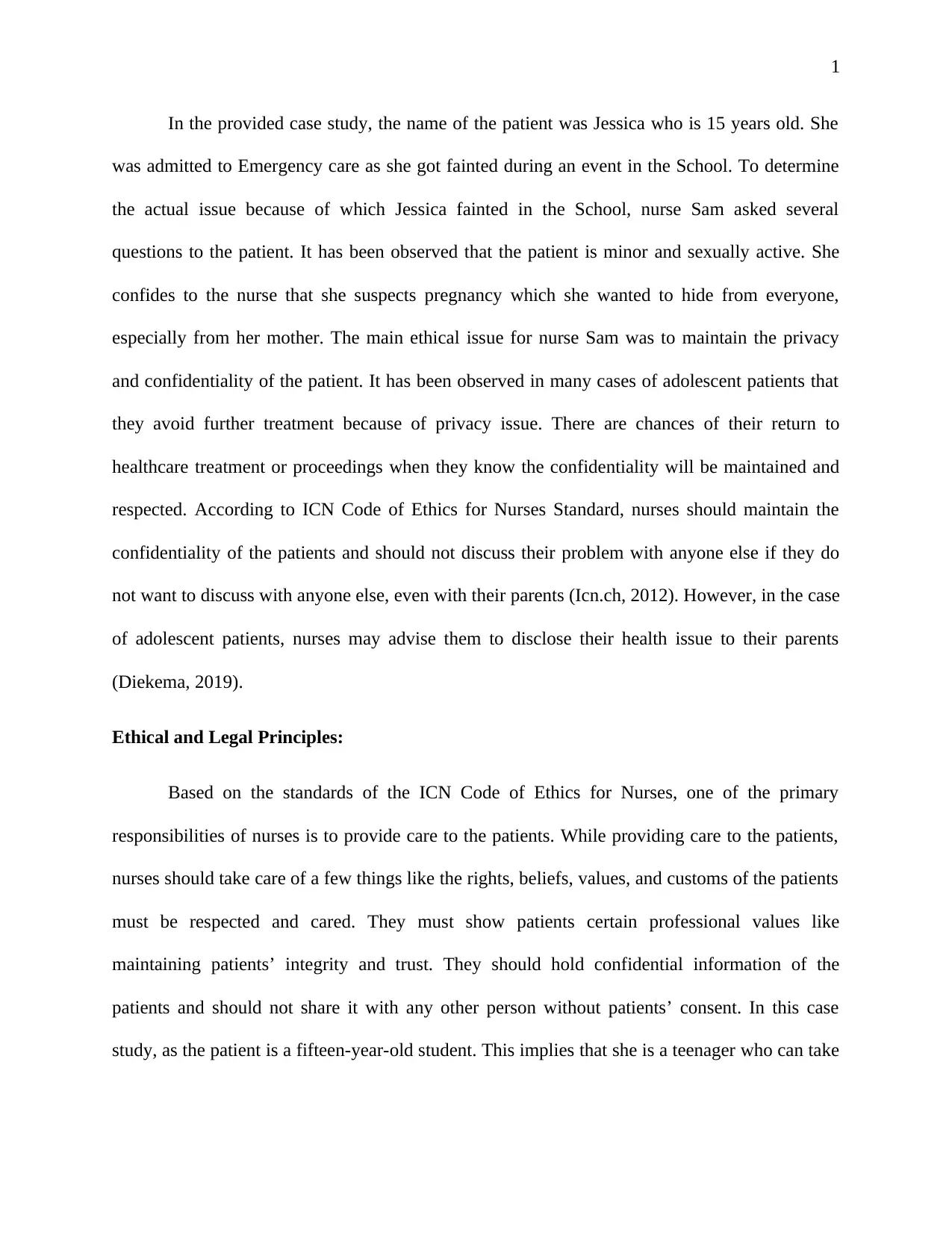
1
In the provided case study, the name of the patient was Jessica who is 15 years old. She
was admitted to Emergency care as she got fainted during an event in the School. To determine
the actual issue because of which Jessica fainted in the School, nurse Sam asked several
questions to the patient. It has been observed that the patient is minor and sexually active. She
confides to the nurse that she suspects pregnancy which she wanted to hide from everyone,
especially from her mother. The main ethical issue for nurse Sam was to maintain the privacy
and confidentiality of the patient. It has been observed in many cases of adolescent patients that
they avoid further treatment because of privacy issue. There are chances of their return to
healthcare treatment or proceedings when they know the confidentiality will be maintained and
respected. According to ICN Code of Ethics for Nurses Standard, nurses should maintain the
confidentiality of the patients and should not discuss their problem with anyone else if they do
not want to discuss with anyone else, even with their parents (Icn.ch, 2012). However, in the case
of adolescent patients, nurses may advise them to disclose their health issue to their parents
(Diekema, 2019).
Ethical and Legal Principles:
Based on the standards of the ICN Code of Ethics for Nurses, one of the primary
responsibilities of nurses is to provide care to the patients. While providing care to the patients,
nurses should take care of a few things like the rights, beliefs, values, and customs of the patients
must be respected and cared. They must show patients certain professional values like
maintaining patients’ integrity and trust. They should hold confidential information of the
patients and should not share it with any other person without patients’ consent. In this case
study, as the patient is a fifteen-year-old student. This implies that she is a teenager who can take
In the provided case study, the name of the patient was Jessica who is 15 years old. She
was admitted to Emergency care as she got fainted during an event in the School. To determine
the actual issue because of which Jessica fainted in the School, nurse Sam asked several
questions to the patient. It has been observed that the patient is minor and sexually active. She
confides to the nurse that she suspects pregnancy which she wanted to hide from everyone,
especially from her mother. The main ethical issue for nurse Sam was to maintain the privacy
and confidentiality of the patient. It has been observed in many cases of adolescent patients that
they avoid further treatment because of privacy issue. There are chances of their return to
healthcare treatment or proceedings when they know the confidentiality will be maintained and
respected. According to ICN Code of Ethics for Nurses Standard, nurses should maintain the
confidentiality of the patients and should not discuss their problem with anyone else if they do
not want to discuss with anyone else, even with their parents (Icn.ch, 2012). However, in the case
of adolescent patients, nurses may advise them to disclose their health issue to their parents
(Diekema, 2019).
Ethical and Legal Principles:
Based on the standards of the ICN Code of Ethics for Nurses, one of the primary
responsibilities of nurses is to provide care to the patients. While providing care to the patients,
nurses should take care of a few things like the rights, beliefs, values, and customs of the patients
must be respected and cared. They must show patients certain professional values like
maintaining patients’ integrity and trust. They should hold confidential information of the
patients and should not share it with any other person without patients’ consent. In this case
study, as the patient is a fifteen-year-old student. This implies that she is a teenager who can take
Secure Best Marks with AI Grader
Need help grading? Try our AI Grader for instant feedback on your assignments.
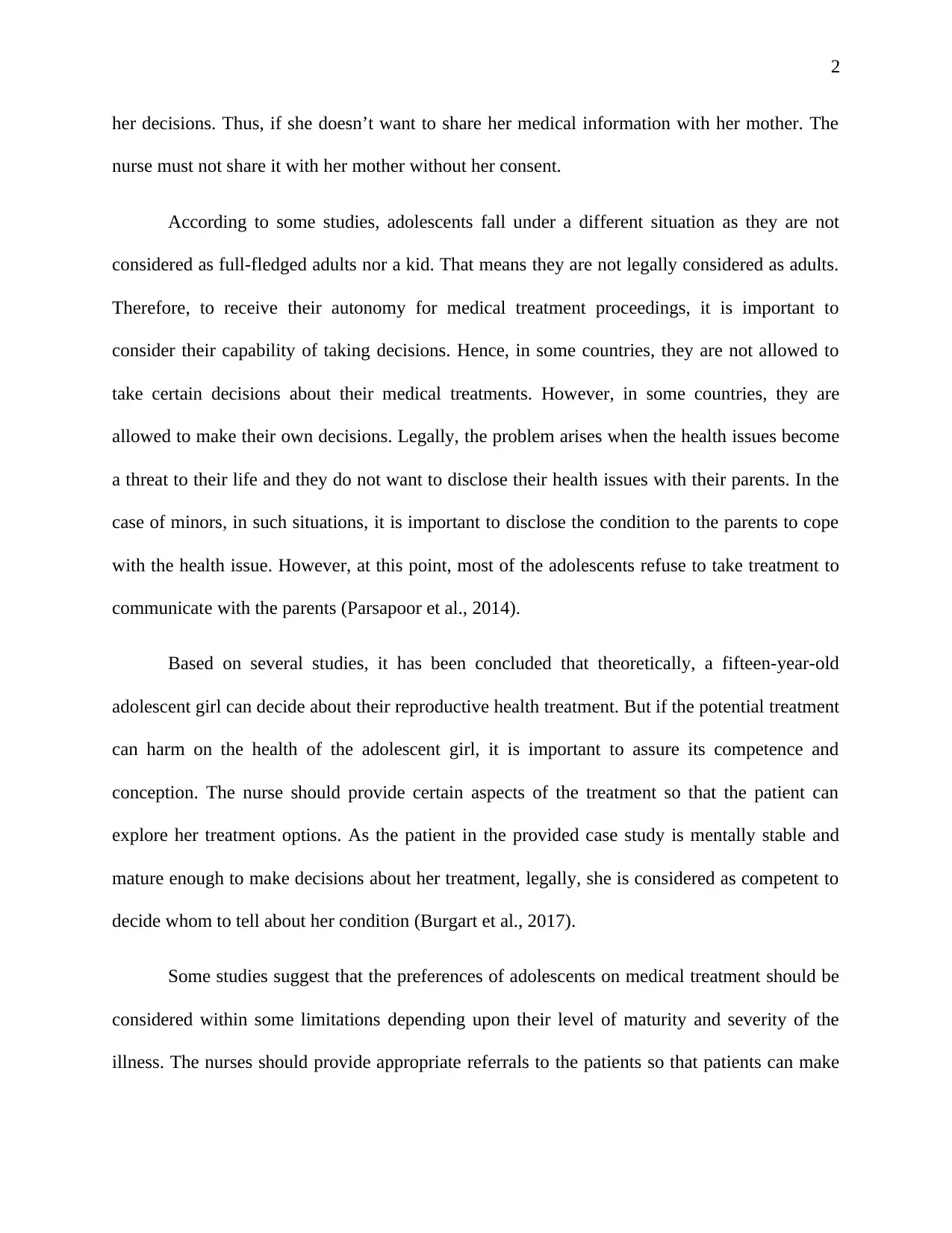
2
her decisions. Thus, if she doesn’t want to share her medical information with her mother. The
nurse must not share it with her mother without her consent.
According to some studies, adolescents fall under a different situation as they are not
considered as full-fledged adults nor a kid. That means they are not legally considered as adults.
Therefore, to receive their autonomy for medical treatment proceedings, it is important to
consider their capability of taking decisions. Hence, in some countries, they are not allowed to
take certain decisions about their medical treatments. However, in some countries, they are
allowed to make their own decisions. Legally, the problem arises when the health issues become
a threat to their life and they do not want to disclose their health issues with their parents. In the
case of minors, in such situations, it is important to disclose the condition to the parents to cope
with the health issue. However, at this point, most of the adolescents refuse to take treatment to
communicate with the parents (Parsapoor et al., 2014).
Based on several studies, it has been concluded that theoretically, a fifteen-year-old
adolescent girl can decide about their reproductive health treatment. But if the potential treatment
can harm on the health of the adolescent girl, it is important to assure its competence and
conception. The nurse should provide certain aspects of the treatment so that the patient can
explore her treatment options. As the patient in the provided case study is mentally stable and
mature enough to make decisions about her treatment, legally, she is considered as competent to
decide whom to tell about her condition (Burgart et al., 2017).
Some studies suggest that the preferences of adolescents on medical treatment should be
considered within some limitations depending upon their level of maturity and severity of the
illness. The nurses should provide appropriate referrals to the patients so that patients can make
her decisions. Thus, if she doesn’t want to share her medical information with her mother. The
nurse must not share it with her mother without her consent.
According to some studies, adolescents fall under a different situation as they are not
considered as full-fledged adults nor a kid. That means they are not legally considered as adults.
Therefore, to receive their autonomy for medical treatment proceedings, it is important to
consider their capability of taking decisions. Hence, in some countries, they are not allowed to
take certain decisions about their medical treatments. However, in some countries, they are
allowed to make their own decisions. Legally, the problem arises when the health issues become
a threat to their life and they do not want to disclose their health issues with their parents. In the
case of minors, in such situations, it is important to disclose the condition to the parents to cope
with the health issue. However, at this point, most of the adolescents refuse to take treatment to
communicate with the parents (Parsapoor et al., 2014).
Based on several studies, it has been concluded that theoretically, a fifteen-year-old
adolescent girl can decide about their reproductive health treatment. But if the potential treatment
can harm on the health of the adolescent girl, it is important to assure its competence and
conception. The nurse should provide certain aspects of the treatment so that the patient can
explore her treatment options. As the patient in the provided case study is mentally stable and
mature enough to make decisions about her treatment, legally, she is considered as competent to
decide whom to tell about her condition (Burgart et al., 2017).
Some studies suggest that the preferences of adolescents on medical treatment should be
considered within some limitations depending upon their level of maturity and severity of the
illness. The nurses should provide appropriate referrals to the patients so that patients can make
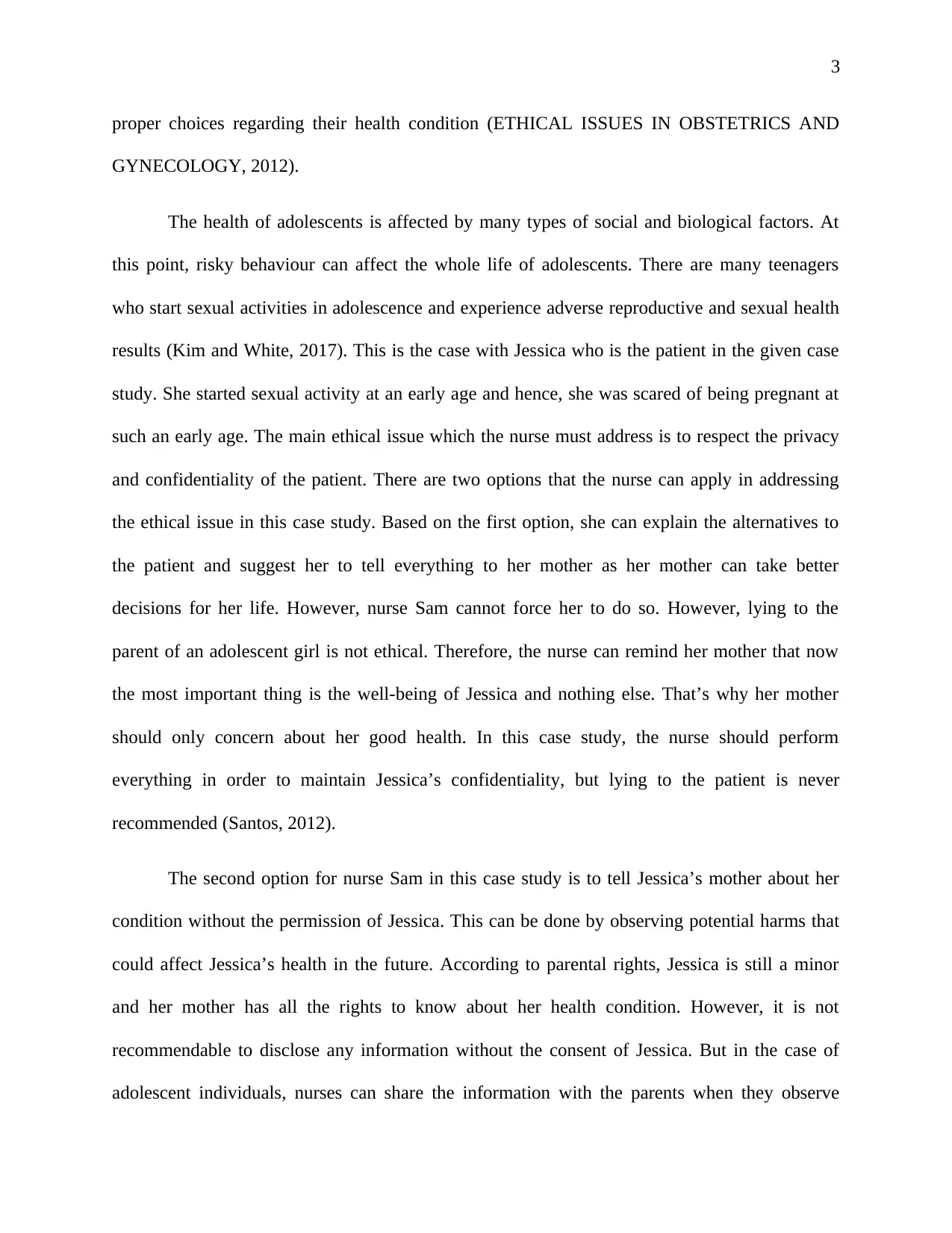
3
proper choices regarding their health condition (ETHICAL ISSUES IN OBSTETRICS AND
GYNECOLOGY, 2012).
The health of adolescents is affected by many types of social and biological factors. At
this point, risky behaviour can affect the whole life of adolescents. There are many teenagers
who start sexual activities in adolescence and experience adverse reproductive and sexual health
results (Kim and White, 2017). This is the case with Jessica who is the patient in the given case
study. She started sexual activity at an early age and hence, she was scared of being pregnant at
such an early age. The main ethical issue which the nurse must address is to respect the privacy
and confidentiality of the patient. There are two options that the nurse can apply in addressing
the ethical issue in this case study. Based on the first option, she can explain the alternatives to
the patient and suggest her to tell everything to her mother as her mother can take better
decisions for her life. However, nurse Sam cannot force her to do so. However, lying to the
parent of an adolescent girl is not ethical. Therefore, the nurse can remind her mother that now
the most important thing is the well-being of Jessica and nothing else. That’s why her mother
should only concern about her good health. In this case study, the nurse should perform
everything in order to maintain Jessica’s confidentiality, but lying to the patient is never
recommended (Santos, 2012).
The second option for nurse Sam in this case study is to tell Jessica’s mother about her
condition without the permission of Jessica. This can be done by observing potential harms that
could affect Jessica’s health in the future. According to parental rights, Jessica is still a minor
and her mother has all the rights to know about her health condition. However, it is not
recommendable to disclose any information without the consent of Jessica. But in the case of
adolescent individuals, nurses can share the information with the parents when they observe
proper choices regarding their health condition (ETHICAL ISSUES IN OBSTETRICS AND
GYNECOLOGY, 2012).
The health of adolescents is affected by many types of social and biological factors. At
this point, risky behaviour can affect the whole life of adolescents. There are many teenagers
who start sexual activities in adolescence and experience adverse reproductive and sexual health
results (Kim and White, 2017). This is the case with Jessica who is the patient in the given case
study. She started sexual activity at an early age and hence, she was scared of being pregnant at
such an early age. The main ethical issue which the nurse must address is to respect the privacy
and confidentiality of the patient. There are two options that the nurse can apply in addressing
the ethical issue in this case study. Based on the first option, she can explain the alternatives to
the patient and suggest her to tell everything to her mother as her mother can take better
decisions for her life. However, nurse Sam cannot force her to do so. However, lying to the
parent of an adolescent girl is not ethical. Therefore, the nurse can remind her mother that now
the most important thing is the well-being of Jessica and nothing else. That’s why her mother
should only concern about her good health. In this case study, the nurse should perform
everything in order to maintain Jessica’s confidentiality, but lying to the patient is never
recommended (Santos, 2012).
The second option for nurse Sam in this case study is to tell Jessica’s mother about her
condition without the permission of Jessica. This can be done by observing potential harms that
could affect Jessica’s health in the future. According to parental rights, Jessica is still a minor
and her mother has all the rights to know about her health condition. However, it is not
recommendable to disclose any information without the consent of Jessica. But in the case of
adolescent individuals, nurses can share the information with the parents when they observe
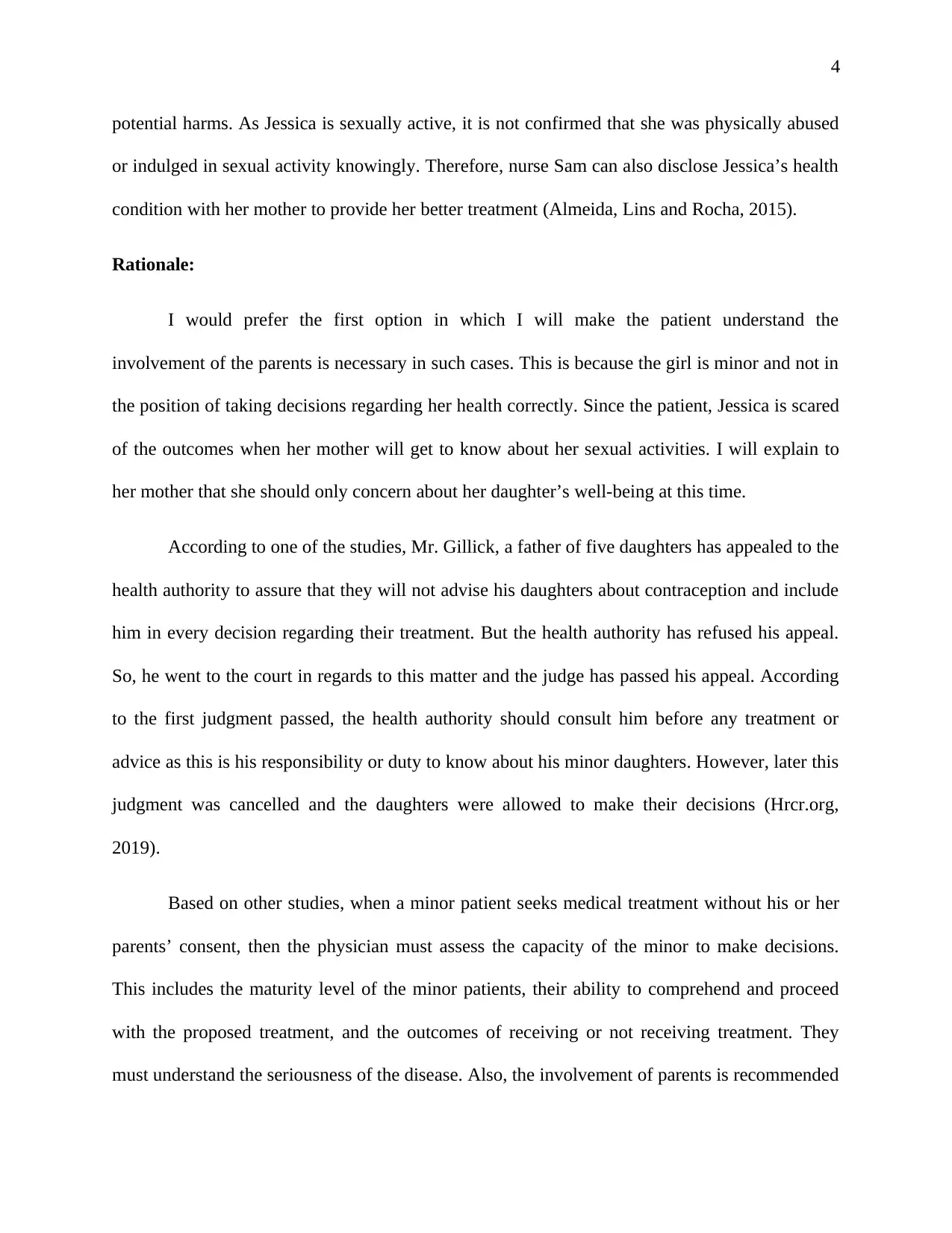
4
potential harms. As Jessica is sexually active, it is not confirmed that she was physically abused
or indulged in sexual activity knowingly. Therefore, nurse Sam can also disclose Jessica’s health
condition with her mother to provide her better treatment (Almeida, Lins and Rocha, 2015).
Rationale:
I would prefer the first option in which I will make the patient understand the
involvement of the parents is necessary in such cases. This is because the girl is minor and not in
the position of taking decisions regarding her health correctly. Since the patient, Jessica is scared
of the outcomes when her mother will get to know about her sexual activities. I will explain to
her mother that she should only concern about her daughter’s well-being at this time.
According to one of the studies, Mr. Gillick, a father of five daughters has appealed to the
health authority to assure that they will not advise his daughters about contraception and include
him in every decision regarding their treatment. But the health authority has refused his appeal.
So, he went to the court in regards to this matter and the judge has passed his appeal. According
to the first judgment passed, the health authority should consult him before any treatment or
advice as this is his responsibility or duty to know about his minor daughters. However, later this
judgment was cancelled and the daughters were allowed to make their decisions (Hrcr.org,
2019).
Based on other studies, when a minor patient seeks medical treatment without his or her
parents’ consent, then the physician must assess the capacity of the minor to make decisions.
This includes the maturity level of the minor patients, their ability to comprehend and proceed
with the proposed treatment, and the outcomes of receiving or not receiving treatment. They
must understand the seriousness of the disease. Also, the involvement of parents is recommended
potential harms. As Jessica is sexually active, it is not confirmed that she was physically abused
or indulged in sexual activity knowingly. Therefore, nurse Sam can also disclose Jessica’s health
condition with her mother to provide her better treatment (Almeida, Lins and Rocha, 2015).
Rationale:
I would prefer the first option in which I will make the patient understand the
involvement of the parents is necessary in such cases. This is because the girl is minor and not in
the position of taking decisions regarding her health correctly. Since the patient, Jessica is scared
of the outcomes when her mother will get to know about her sexual activities. I will explain to
her mother that she should only concern about her daughter’s well-being at this time.
According to one of the studies, Mr. Gillick, a father of five daughters has appealed to the
health authority to assure that they will not advise his daughters about contraception and include
him in every decision regarding their treatment. But the health authority has refused his appeal.
So, he went to the court in regards to this matter and the judge has passed his appeal. According
to the first judgment passed, the health authority should consult him before any treatment or
advice as this is his responsibility or duty to know about his minor daughters. However, later this
judgment was cancelled and the daughters were allowed to make their decisions (Hrcr.org,
2019).
Based on other studies, when a minor patient seeks medical treatment without his or her
parents’ consent, then the physician must assess the capacity of the minor to make decisions.
This includes the maturity level of the minor patients, their ability to comprehend and proceed
with the proposed treatment, and the outcomes of receiving or not receiving treatment. They
must understand the seriousness of the disease. Also, the involvement of parents is recommended
Secure Best Marks with AI Grader
Need help grading? Try our AI Grader for instant feedback on your assignments.
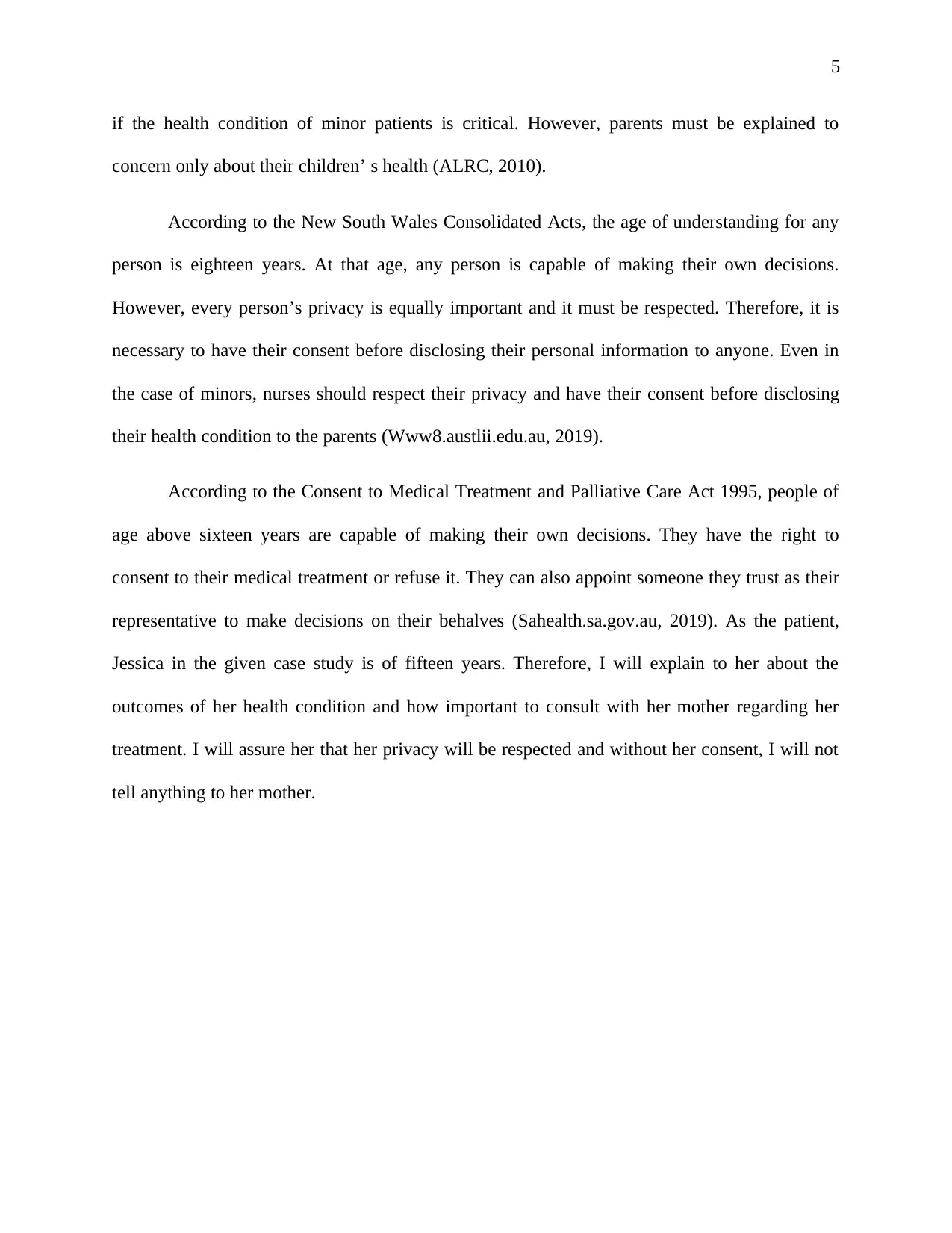
5
if the health condition of minor patients is critical. However, parents must be explained to
concern only about their children’ s health (ALRC, 2010).
According to the New South Wales Consolidated Acts, the age of understanding for any
person is eighteen years. At that age, any person is capable of making their own decisions.
However, every person’s privacy is equally important and it must be respected. Therefore, it is
necessary to have their consent before disclosing their personal information to anyone. Even in
the case of minors, nurses should respect their privacy and have their consent before disclosing
their health condition to the parents (Www8.austlii.edu.au, 2019).
According to the Consent to Medical Treatment and Palliative Care Act 1995, people of
age above sixteen years are capable of making their own decisions. They have the right to
consent to their medical treatment or refuse it. They can also appoint someone they trust as their
representative to make decisions on their behalves (Sahealth.sa.gov.au, 2019). As the patient,
Jessica in the given case study is of fifteen years. Therefore, I will explain to her about the
outcomes of her health condition and how important to consult with her mother regarding her
treatment. I will assure her that her privacy will be respected and without her consent, I will not
tell anything to her mother.
if the health condition of minor patients is critical. However, parents must be explained to
concern only about their children’ s health (ALRC, 2010).
According to the New South Wales Consolidated Acts, the age of understanding for any
person is eighteen years. At that age, any person is capable of making their own decisions.
However, every person’s privacy is equally important and it must be respected. Therefore, it is
necessary to have their consent before disclosing their personal information to anyone. Even in
the case of minors, nurses should respect their privacy and have their consent before disclosing
their health condition to the parents (Www8.austlii.edu.au, 2019).
According to the Consent to Medical Treatment and Palliative Care Act 1995, people of
age above sixteen years are capable of making their own decisions. They have the right to
consent to their medical treatment or refuse it. They can also appoint someone they trust as their
representative to make decisions on their behalves (Sahealth.sa.gov.au, 2019). As the patient,
Jessica in the given case study is of fifteen years. Therefore, I will explain to her about the
outcomes of her health condition and how important to consult with her mother regarding her
treatment. I will assure her that her privacy will be respected and without her consent, I will not
tell anything to her mother.
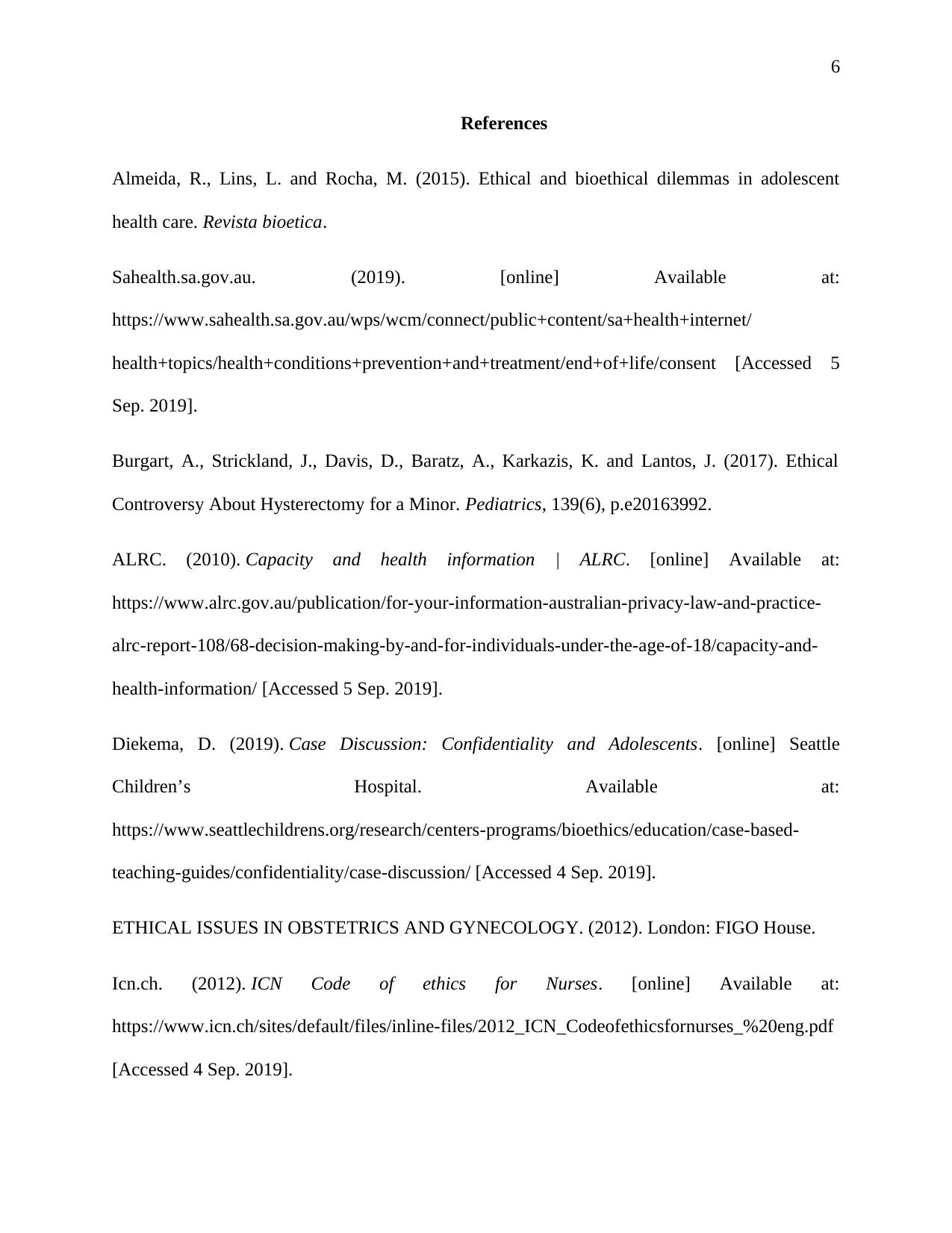
6
References
Almeida, R., Lins, L. and Rocha, M. (2015). Ethical and bioethical dilemmas in adolescent
health care. Revista bioetica.
Sahealth.sa.gov.au. (2019). [online] Available at:
https://www.sahealth.sa.gov.au/wps/wcm/connect/public+content/sa+health+internet/
health+topics/health+conditions+prevention+and+treatment/end+of+life/consent [Accessed 5
Sep. 2019].
Burgart, A., Strickland, J., Davis, D., Baratz, A., Karkazis, K. and Lantos, J. (2017). Ethical
Controversy About Hysterectomy for a Minor. Pediatrics, 139(6), p.e20163992.
ALRC. (2010). Capacity and health information | ALRC. [online] Available at:
https://www.alrc.gov.au/publication/for-your-information-australian-privacy-law-and-practice-
alrc-report-108/68-decision-making-by-and-for-individuals-under-the-age-of-18/capacity-and-
health-information/ [Accessed 5 Sep. 2019].
Diekema, D. (2019). Case Discussion: Confidentiality and Adolescents. [online] Seattle
Children’s Hospital. Available at:
https://www.seattlechildrens.org/research/centers-programs/bioethics/education/case-based-
teaching-guides/confidentiality/case-discussion/ [Accessed 4 Sep. 2019].
ETHICAL ISSUES IN OBSTETRICS AND GYNECOLOGY. (2012). London: FIGO House.
Icn.ch. (2012). ICN Code of ethics for Nurses. [online] Available at:
https://www.icn.ch/sites/default/files/inline-files/2012_ICN_Codeofethicsfornurses_%20eng.pdf
[Accessed 4 Sep. 2019].
References
Almeida, R., Lins, L. and Rocha, M. (2015). Ethical and bioethical dilemmas in adolescent
health care. Revista bioetica.
Sahealth.sa.gov.au. (2019). [online] Available at:
https://www.sahealth.sa.gov.au/wps/wcm/connect/public+content/sa+health+internet/
health+topics/health+conditions+prevention+and+treatment/end+of+life/consent [Accessed 5
Sep. 2019].
Burgart, A., Strickland, J., Davis, D., Baratz, A., Karkazis, K. and Lantos, J. (2017). Ethical
Controversy About Hysterectomy for a Minor. Pediatrics, 139(6), p.e20163992.
ALRC. (2010). Capacity and health information | ALRC. [online] Available at:
https://www.alrc.gov.au/publication/for-your-information-australian-privacy-law-and-practice-
alrc-report-108/68-decision-making-by-and-for-individuals-under-the-age-of-18/capacity-and-
health-information/ [Accessed 5 Sep. 2019].
Diekema, D. (2019). Case Discussion: Confidentiality and Adolescents. [online] Seattle
Children’s Hospital. Available at:
https://www.seattlechildrens.org/research/centers-programs/bioethics/education/case-based-
teaching-guides/confidentiality/case-discussion/ [Accessed 4 Sep. 2019].
ETHICAL ISSUES IN OBSTETRICS AND GYNECOLOGY. (2012). London: FIGO House.
Icn.ch. (2012). ICN Code of ethics for Nurses. [online] Available at:
https://www.icn.ch/sites/default/files/inline-files/2012_ICN_Codeofethicsfornurses_%20eng.pdf
[Accessed 4 Sep. 2019].
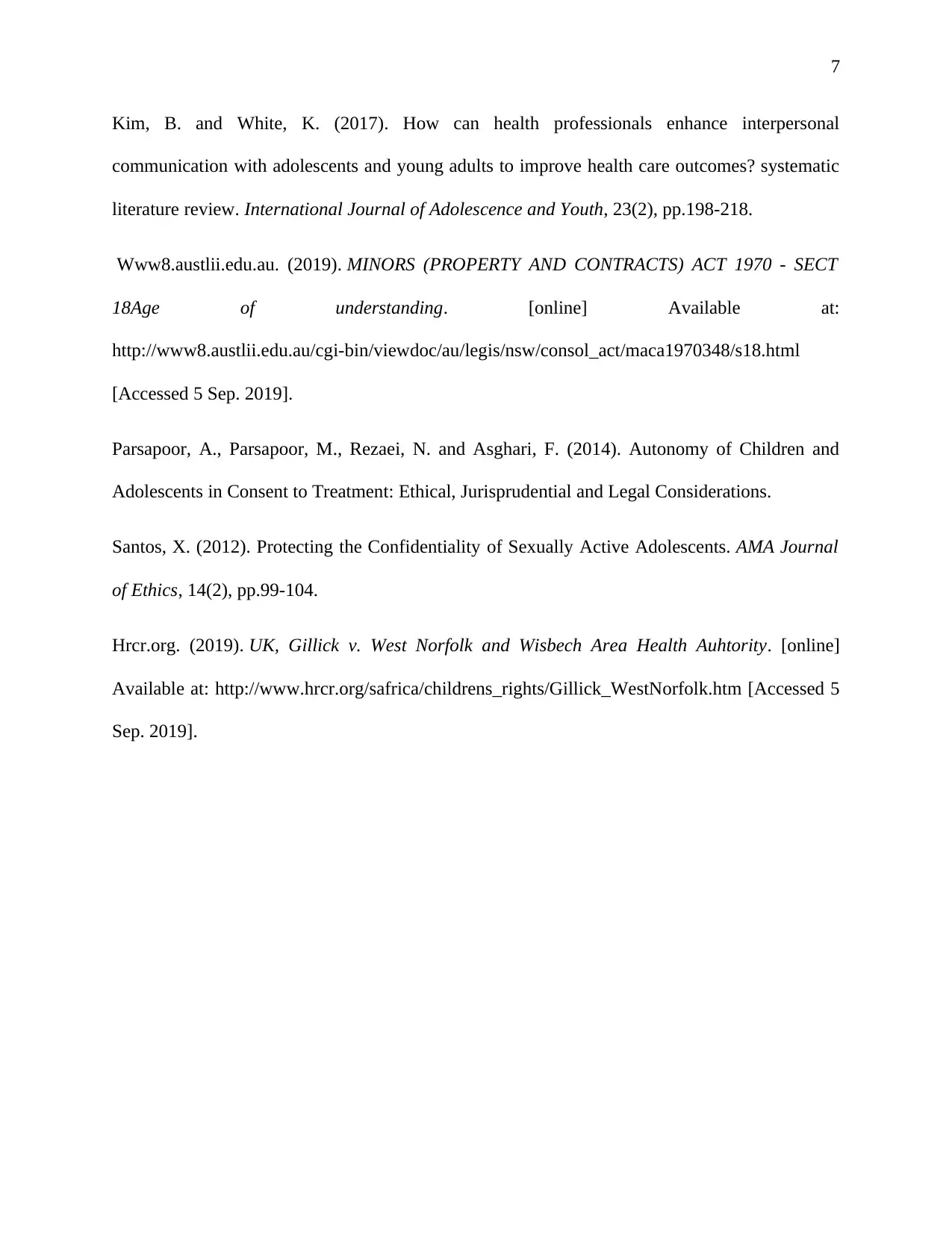
7
Kim, B. and White, K. (2017). How can health professionals enhance interpersonal
communication with adolescents and young adults to improve health care outcomes? systematic
literature review. International Journal of Adolescence and Youth, 23(2), pp.198-218.
Www8.austlii.edu.au. (2019). MINORS (PROPERTY AND CONTRACTS) ACT 1970 - SECT
18Age of understanding. [online] Available at:
http://www8.austlii.edu.au/cgi-bin/viewdoc/au/legis/nsw/consol_act/maca1970348/s18.html
[Accessed 5 Sep. 2019].
Parsapoor, A., Parsapoor, M., Rezaei, N. and Asghari, F. (2014). Autonomy of Children and
Adolescents in Consent to Treatment: Ethical, Jurisprudential and Legal Considerations.
Santos, X. (2012). Protecting the Confidentiality of Sexually Active Adolescents. AMA Journal
of Ethics, 14(2), pp.99-104.
Hrcr.org. (2019). UK, Gillick v. West Norfolk and Wisbech Area Health Auhtority. [online]
Available at: http://www.hrcr.org/safrica/childrens_rights/Gillick_WestNorfolk.htm [Accessed 5
Sep. 2019].
Kim, B. and White, K. (2017). How can health professionals enhance interpersonal
communication with adolescents and young adults to improve health care outcomes? systematic
literature review. International Journal of Adolescence and Youth, 23(2), pp.198-218.
Www8.austlii.edu.au. (2019). MINORS (PROPERTY AND CONTRACTS) ACT 1970 - SECT
18Age of understanding. [online] Available at:
http://www8.austlii.edu.au/cgi-bin/viewdoc/au/legis/nsw/consol_act/maca1970348/s18.html
[Accessed 5 Sep. 2019].
Parsapoor, A., Parsapoor, M., Rezaei, N. and Asghari, F. (2014). Autonomy of Children and
Adolescents in Consent to Treatment: Ethical, Jurisprudential and Legal Considerations.
Santos, X. (2012). Protecting the Confidentiality of Sexually Active Adolescents. AMA Journal
of Ethics, 14(2), pp.99-104.
Hrcr.org. (2019). UK, Gillick v. West Norfolk and Wisbech Area Health Auhtority. [online]
Available at: http://www.hrcr.org/safrica/childrens_rights/Gillick_WestNorfolk.htm [Accessed 5
Sep. 2019].
1 out of 7
Related Documents
Your All-in-One AI-Powered Toolkit for Academic Success.
+13062052269
info@desklib.com
Available 24*7 on WhatsApp / Email
![[object Object]](/_next/static/media/star-bottom.7253800d.svg)
Unlock your academic potential
© 2024 | Zucol Services PVT LTD | All rights reserved.





